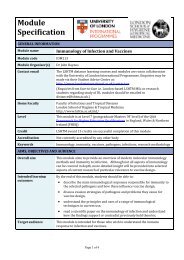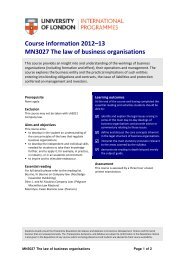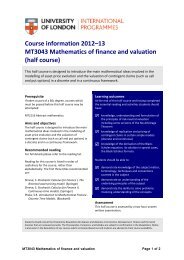Principles of sociology - University of London International ...
Principles of sociology - University of London International ...
Principles of sociology - University of London International ...
You also want an ePaper? Increase the reach of your titles
YUMPU automatically turns print PDFs into web optimized ePapers that Google loves.
21 <strong>Principles</strong> <strong>of</strong> <strong>sociology</strong><br />
28<br />
Let’s take nationality first. You too may have put down your nationality. This<br />
is because, for many people, their nationality is still an important statement<br />
<strong>of</strong> their social identity. To say I am Malaysian, Indian, Singaporean or British<br />
is to say much more than I live in a particular region <strong>of</strong> the world. Most<br />
nation states, or countries, not only have their own language, government<br />
and laws, they also have their own traditions, customs and generally<br />
accepted ways <strong>of</strong> behaving. Sociologists refer to these as norms. Many<br />
<strong>of</strong> these norms vary over time within a particular country and also vary<br />
between countries. For example, smoking in public places or consuming<br />
alcohol are legal in some countries but illegal in others. These cultural<br />
norms have an important influence on us. They affect how we behave, how<br />
we view the behaviour <strong>of</strong> others and how we ‘see’ the world.<br />
However, although nationality is a very clear and unambiguous source<br />
<strong>of</strong> identity for some people, it’s not the same for others. Many countries<br />
are increasingly comprised <strong>of</strong> different ethnic groups. By an ethnic group,<br />
sociologists mean a social group that has certain common characteristics,<br />
such as a shared culture, history, language, customs and institutions. For<br />
many people their ethnicity may be an equally, or more, important source<br />
<strong>of</strong> identity than their national identity. Describing herself as British and<br />
Afro-Caribbean suggests that, for Julie, both her nationality and ethnicity<br />
are important sources <strong>of</strong> identity, as they are for many people. However,<br />
whether a person identifies primarily with a nation or with an ethnic<br />
group, or with a combination <strong>of</strong> the two, the same sociological ideas<br />
apply. Nationality and ethnicity confer identities on people that influence<br />
their relationships, values and behaviour. (See Chapter 10 on ‘Race’ and<br />
ethnicity for a further discussion on this point.)<br />
Like Julie, you probably put down your gender as one <strong>of</strong> the most<br />
important ways <strong>of</strong> describing yourself. Although gender may appear to be<br />
purely biological, as we are simply born either male or female, sociologists<br />
have shown that gender has important social dimensions. Social and<br />
ethnic groups tend to place different expectations on males and females<br />
and this then shapes the subsequent behaviour <strong>of</strong> boys and girls and<br />
men and women. For example, in most cultures, boys are expected to be<br />
‘tough’ and ‘masculine’, and boisterous and aggressive behaviour is usually<br />
tolerated more in boys than in girls, whereas girls are usually expected to<br />
be more mature, show a better standard <strong>of</strong> behaviour and help around the<br />
house more. Thus, for sociologists, gender is not just a biological category.<br />
It is also social. We don’t just become men or women. In important<br />
respects we learn to be men or women through social interaction.<br />
Activity 1.7 Gender differences<br />
Stop and think about this last example for a minute and write down five ways that you<br />
think your life would be different if you had been born male rather than female, or female<br />
rather than male.<br />
Which <strong>of</strong> these differences do you think are primarily due to biological causes (for<br />
example, men are physically stronger, women bear children) and which <strong>of</strong> them do you<br />
think are due to the way in which your society is organised (for example its cultural<br />
values, availability <strong>of</strong> employment opportunities, access to public places).<br />
Social roles<br />
Like Julie, you may also have put down some <strong>of</strong> the things you do. In<br />
answers 4–7 she has told us about her occupation, that she is a student<br />
and that she is a wife and a mother. These are also common everyday<br />
words, but they have also have specific social expectations attached to
















